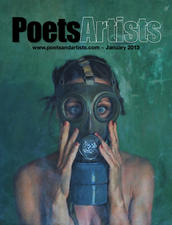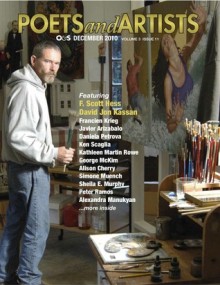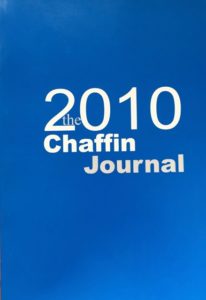Menu

(Poets & Artists, Issue #42, January 2013)
HOMELAND
When did you turn into such an American?
Mother asks when I return
for my annual summer pilgrimage.
A baby goat lays slaughtered in my honor
by the old stone and mud house
in the mountains
where houses cling to the steep slopes
like some wretched crows
in the branches of the old walnut tree
under which we ate lunch in the summers
when my grandfather put down the hoe
and my uncle came back with the goats.
Back when I climbed the walnut tree
and swung off its branches
and didn’t mind the outhouse
up the narrow path
where instead of toilet paper
old newspapers hung on a rusty nail.
Back when I helped Grandma bake bread
in the woodstove,
and in school
I wore the red Young Pioneers scarf.
Back when I hadn’t even heard
of the skyscrapers and highways
in that place far away
that will bewitch me years later
from the small black and white screen
that Mother covered with an embroidered cloth
to keep the dust away.
The walnut tree has long dried out
and my grandparents’ hands
are brown and knotted
like its roots,
and the house smells of rot
and old Communist books.
The outhouse buzzes with flies
and I am upset
about a dead baby goat.
Guilt greases my fingers
when I try to eat it.
When did I turn into such an American?
I bring presents,
cheap stuff from Chinatown
a wristwatch for Grandpa and
a fake Armani shirt for my uncle,
who’s back with the goats,
and I’m ashamed
because he thinks its real.
I tightrope walk
between two continents
and the sea in between
only grows wider
and I no longer know
where home is.
I worked hard in America.
I cleaned Fifth Avenue apartments
whose owners forgot to pay me,
and at night, at the 92 Street Y,
I studied English
across from a Swedish au pair
and a Russian PhD historian.
I learned to do small talk
and smile at strangers.
But I will always be the girl at the party
everyone asks: “Where you from?”
Back where I am from,
the cafés are choked in cigarette smoke
and along the highways
girls stand in miniskirts
like spring flowers
sprouting from the trash.
And my old friends
who used to gather in the city squares
shouting, “Down with the Reds,
we want democracy,”
flaunt their latest model cell phones.
And my uncle says
he wants to be buried
in his Armani shirt.

COMRADE GOD
I grew up fearless of you.
Free of you. Empty of you.
You, my schoolbook said,
were nothing but an invention
to keep the masses at bay.
In New York City decades later
under a crescent moon unmoved
aches unarticulated
dreams undone
I gaze into a neon void
and whisper your name.
Fear has many faces
and the honey voice of copper
(mine tastes of cigarettes and semi-dark chocolate).
I abandon myself to oblivion.
I gorge on stupor sprinkled with nothingness.
But I long to believe
and belief is what I ask for:
Comrade God,
please give me faith.
AFTER THE WALL
Skinheads
Junkies
Mafia
Children in rags
beg on the streets
Old people with canes
dig into garbage bins
Hookers in miniskirts grow
like weeds
by the roads
outside the cities.
McDonalds
Dunkin Donuts
Starbucks—
we’ve got it all.
Freedom, says the crow,
perched on the shoulder of the beheaded Lenin’s statue,
is plain old Capitalism
cloaked in the robes of Democracy.
Because there was no God
and there was no competition
and no motivation to work
because Money was Evil
and the Party was King
because they pretended to pay us
and we pretended to work
because we were all equal
—equally terrified of Durzhavna Sigurnost
because we hunted Levi’s jeans
and fought at grocery stores for bananas
and there was something about Freedom of Speech
and Free Market
but I was just a kid
standing guard by Brezhnev’s bust in school
hand raised, thumb folded,
the Young Pioneer’s scarf flaming around my neck

(Chaffin Journal, 2010)
Communism Remembered
Snow gathers
on the gray coats of people,
lining in front of the store
for more than two blocks.
People who’d left work
because they’d heard
there were bananas
in the grocery on Zhdanov Street.
I stand guard
by Brezhnev’s bust
in my Young Pioneers uniform
that gray November day he died.
Chernobyl cherries taste just
like any other cherries.
The Communist government
forgot to tell us about
the disaster and the danger
of eating the fruits
that fed on the Chernobyl rains.
My neighbor lays dead,
shot in the chest
only 23 years old, a teacher
whose boyfriend shot her
but didn’t spent a day behind bars
because his father
was in the Communist Echelon.
We are all in the kitchen,
cuddled around the kerosene stove,
my uncle sitting with his ear glued to the radio
from where The Voice of America
comes and goes out of tune.
Copyright 2024 © DanielaPetrova.com All Rights Reserved
Menu